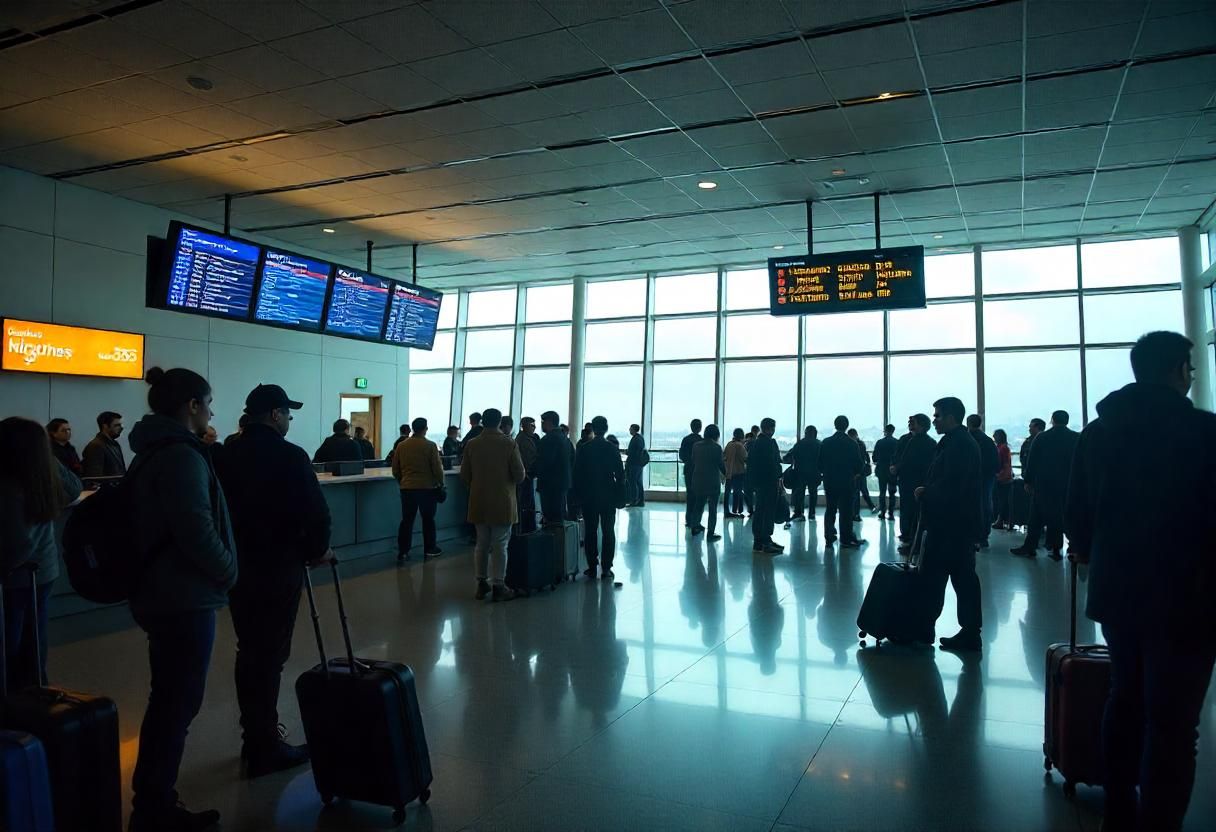Chaos in the Skies: Summer Storms Trigger Mass Flight Cancellations Across US, Stranding Thousands

Mid-July 2025 witnessed severe weather patterns wreak widespread havoc on air travel across the United States, particularly along the East Coast, causing thousands of flight delays and cancellations. Storms on July 14, working their way up the coast, initiated major disruptions at key hubs including New York’sbusiest airports, JFK International, LaGuardia, andNewark Liberty.
These disruptions, characterized by flash flood warnings, ground stops, and hours-long delays, left countless travelers stranded and exacerbated an already cluttered summer travel season where passenger numbers had already surpassed pre-pandemic levels. The impact of the storms was acutely felt across the East Coast, with significant lingering chaos observed at New York’s airports through July 15. More than 7,800 U.S. flights experienced delays and nearly 1,500 were canceled through the end of July 14, with a substantial portion of these tied to the New York metro area.
Photo Credit: Travel and Tour World
LaGuardia Airportwas exceptionally hard-hit, reporting just under 200 cancellations, accounting for a third of its daily schedule. Newark Liberty saw 112 cancellations, while JFK recorded 38. Other major East Coast hubs like Washington Reagan National and Philadelphia International also faced dozens of cancellations.
Beyond the East Coast, the operational breakdown spread nationwide, affecting major hubs such as Hartsfield-Jackson Atlanta, Dallas-Fort Worth, Chicago O’Hare, Orlando International, and Denver International. Across these top domestic hubs, more than 1,000 combined delays and over 200 cancellations were logged, highlighting the severe strain on air traffic control systems and critical infrastructure. The combination of lightning strikes, low visibility, and saturated airspace severely crippled takeoff and landing sequences, leading to logistical gridlock.
Several major airlines bore the brunt of the storm's impact. United Airlines, already grappling with high traffic volumes, was notably affected, especially at its Newark Liberty hub where its operations were overwhelmed. On July 14 alone, United recorded 243 cancellations and over 1,200 delays, with disruptions continuing into July 15 with 123 cancellations and more than 325 delays. The airline issued travel waivers to allow affected customers to re-book flights without additional fees, albeit within the same cabin and city-pair.
American Airlines also reported significant disruptions, totaling almost 350 cancellations and 1,400 delays across its network, with its operations at Dallas-Fort Worth and Reagan National being particularly strained. Delta Air Lines experienced a dramatic operational breakdown, especially at its Atlanta Hartsfield-Jackson hub, which saw 326 delays, the highest in the U.S. and 37 cancellations. Even regional carriers like Republic Airways, due to their partnerships with major airlines, faced substantial setbacks, recording 390 cancellations and 268 delays.
Photo Credit: Times of India
This week’s events underscore the vulnerability of the U.S. air travel infrastructure, particularly during peak summer demand. With July being one of the busiest months for air passengers and crowds already exceeding pre-pandemic levels, even minor delays escalate into massive disruptions. The extensive delays and cancellations served as a stark reminder that the U.S. aviation system is operating close to its operational limits. Although the immediate storms have cleared, meteorologists anticipate more inclement weather in the Northeast and Midwest.
Travelers are advised to frequently monitor their flight statuses via airline apps, consider booking morning departures to avoid compounding delays, allow generous time between connections, and opt for flexible or refundable tickets whenever possible to navigate the continuing uncertainties. Recovery is expected to be slow as airlines attempt to mitigate the widespread impact.
You may also like...
Sports Betting in Africa: Quick Money or Long-Term Addiction?

"Is sports betting in Africa an opportunity for wealth or a trap for addiction? Explore its impact on youth, the role of...
October 2nd: Guinea’s Independence—A Nation With Defiant Beginning and Enduring Story

On October 2, 1958, Guinea made history as the first French colony in Sub-Saharan Africa to boldly declare independence....
The Jumia Story: Lessons From Africa’s First Tech Unicorn

Discover the story of Jumia, Africa’s first tech unicorn, and how platforms like Glovo and Bokku are reshaping e-commerc...
The Silent Cognitive Crisis: Brain Complacency in the Age of AI

“AI offers convenience, but at what cost? Explore how over-reliance on artificial intelligence fuels brain complacency, ...
Legacy Continues: Football Royalty's Son Nets Stunning Screamer for Barcelona Youth

Shane Kluivert, son of Dutch football legend Patrick Kluivert, scored a spectacular 'screamer' for Barcelona's Under-19s...
WNBA Star's Terrifying Health Ordeal: Mitchell Reveals Rhabdomyolysis Left Her Paralyzed

Indiana Fever All-Star guard Kelsey Mitchell revealed she suffered from Rhabdomyolysis during a WNBA semifinal game, cau...
Warner Bros' Box Office Bubble Bursts, But Industry Shrugs: What Does It Mean?

Paul Thomas Anderson's "One Battle After Another" marks a different kind of success for Warner Bros., earning critical a...
DCU's Nightmare: Are Film Franchises Repeating MCU's Fatal Flaws?

The DCU's increasing interconnectivity, particularly in <i>Peacemaker</i> Season 2, is raising concerns about potential ...


